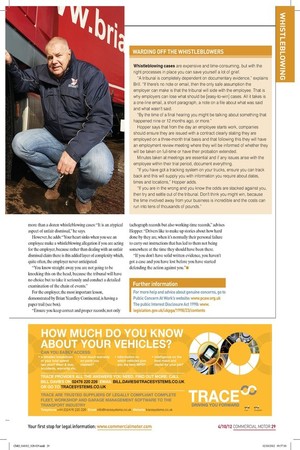WARDING OFF THE WHISTLEBLOWERS
Page 21

If you've noticed an error in this article please click here to report it so we can fix it.
Whistleblowing cases are expensive and time-consuming, but with the right processes in place you can save yourself a lot of grief.
“A tribunal is completely dependent on documentary evidence,” explains Brill. “If there’s no note or email, then the only safe assumption the employer can make is that the tribunal will side with the employee. That is why employers can lose what should be [easy-to-win] cases. All it takes is a one-line email, a short paragraph, a note on a file about what was said and what wasn’t said.
“By the time of a final hearing you might be talking about something that happened nine or 12 months ago, or more.” Hopper says that from the day an employee starts work, companies should ensure they are issued with a contract clearly stating they are employed on a three-month trial basis and that following this they will have an employment review meeting where they will be informed of whether they will be taken on full-time or have their probation extended.
Minutes taken at meetings are essential and if any issues arise with the employee within their trial period, document everything.
“If you have got a tracking system on your trucks, ensure you can track back and this will supply you with information you require about dates, times and locations,” Hopper adds.
“If you are in the wrong and you know the odds are stacked against you, then try and settle out of the tribunal. Don’t think you might win, because the time involved away from your business is incredible and the costs can run into tens of thousands of pounds.”










































